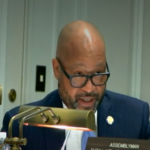Committee Hears Testimony on Legislative Redistricting Resolution

The Assembly Judiciary Committee this afternoon considered Assembly Concurrent Resolution No. 188

with committee amendments. The resolution proposes a constitutional amendment to modify the 2021 legislative redistricting schedule if receipt by Governor Phil Murphy is delayed because of the COVID-19 crisis. Critically, it gives more time for a census harvest to accurately reflect minority communities, according to multiple lawmakers testifying in support of the resolution.
The committee ultimately did not take action on the resolution.
A skeptical Assemblyman Chris DePhillips (R-40) peppered some questions at one of the sponsors.
"Couldn't we have a September primary and proceed to have a November general," he wanted to know.
"There are many different scenarios but many would be difficult to achieve," said state Senator Nellie

Pou (D-35), the resolution's backer on the senate side.
The resolution gives New Jersey adequate time to count, the senator argued.
Testifying before the committee, state Senator M. Teresa Ruiz (D-29) backed the resolution in the name of bringing more women and more people of color into a "critically needed space." State Senator Nilsa Cruz-Perez (D-5) likewise offered her support.
"Because of the pandemic, this census has been conducted almost entirely online,

which has put communities of color at a disadvantage," said Cruz-Perez.
"We must make sure [minority] communities are not undercounted," said state Senator Vin Gopal (D-11), who likewise offered his support for the resolution.
Others were not as happy about the resolution, which they decried as an instrument to protect political machines and incumbents. Helen Kioukus, program coordinator for the League of Women Voters of New Jersey, pressed for language to guarantee a "thoughtful redistricting process," which the resolution lacks. Aaron Barden, legal and policy analyst for the Princeton Gerrymandering Project, likewise testified against Assembly Concurrent Resolution No. 188, seeking longer term redistricting reforms.
From the resolution, prime-sponsored in the Assembly by Assemblyman John McKeon (D-27):
The United States Constitution requires a census to be taken every ten years to count the people living in the United States. Data received by the states from the United States Census Bureau is used to create new legislative districts at the start of each new decade to ensure residents have equal representation from their elected officials. However, in New Jersey, if the federal census data is not received by February 15 of the year ending in one, the new legislative districts

cannot be ready on time to meet the legal deadlines for state legislative elections, causing disruptions in the election process. The COVID-19 pandemic has caused the United States Census Bureau to delay its procedures for collecting census data. This delay in data collection may delay the release of the census data to the states, possibly as late as July 31, 2021. This means that New Jersey will not receive the population count on time to create the new legislative districts to meet the legal deadlines for the 2021 State legislative elections.
This constitutional amendment requires the Apportionment Commission to delay its adoption of new legislative districts when the United States Census Bureau does not provide the Governor the redistricting census data by February 15 of the year ending in one.
Currently, the State Constitution requires new legislative districts to be adopted every 10 years following the Governor’s receipt of the decennial census results. The United States Census Bureau conducts the count of the population in each year ending in zero, and provides this data to the states in the year following the year in which the census is taken, ending in one. The State Constitution requires the Apportionment Commission to certify the new legislative districts within one month after the Governor receives the official census data for New Jersey, or on or before February 1 of the year ending in one, whichever date is later. If the 10-member bipartisan commission cannot adopt the new districts within that month, then the Supreme Court appoints an independent member to break the tie vote. The 11-member commission then has one more month to adopt the new districts. Usually, the new districts are ready to be used in the June primary and November general elections for legislators that occur in that year ending in one. However, if the census data is delayed, the new legislative districts would not be ready on time to meet these State legislative election deadlines.
This constitutional amendment modifies the schedule for adopting the legislative districts when the census data is delayed.
As amended by the committee, this constitutional amendment provides that if the Governor receives the census data after February 15 of the year ending in one, the commission will certify the new districts after the November general election of that year, but not later than March 1 of the year ending in two. As amended by the committee, this constitutional amendment also requires the commission to begin conducting its business upon the receipt by the Governor of the official decennial census of the United States for New Jersey, and requires the eleventh member of the commission to be appointed by the Chief Justice of the Supreme Court of New Jersey within one month of the Governor’s receipt of that census data.
The new districts will be used for legislative elections beginning in the year ending in three, and will continue to be used in elections until new districts are adopted after the next census. For the June primary and November general elections in the year ending in one, Senators and Assembly members will be elected by the voters of their existing districts, instead of the new districts. As usual, Senators and Assembly members run for office in the year ending in one and are elected for a term of two years. The old districts will also be in effect in the year ending in two for election purposes, if any legislative election is held in that year.
This constitutional amendment will not alter the appointment of the members of the commission made by the State political party chairs pursuant to Article IV, Section III, paragraph 1 of the State Constitution on or before November 15, and certified by the Secretary of State on or before December 1, of the year in which the census is taken.





